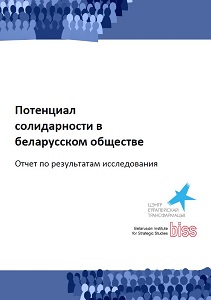Потенциал солидарности в беларусском обществе
The potential of Solidarity in Belarusian Society
Author(s): Tatyana Vodolazskaya, Oksana Shelest, Andrey Egorov, Elena Artemenko
Subject(s): Sociology of Culture, Post-Communist Transformation, Sociology of Politics
Published by: Центр европейской трансформации
Summary/Abstract: Over the past few years, in the social and political life of Belarusian society, we have observed a decrease in the ability of citizens to take effective joint political and social actions, to publicly and actively express their own position and defend common interests. Despite the growing number of petitions, public statements, signature collections, we observe not only the lack of impact of these instruments on life in the country, but also their weak mobilization potential. Most often, they remain a way of expressing a personal position, but they do not lead either to the development of further joint actions or to a change in the situation. The general trends of social and political life indicate not only a decrease in political activity, but also a change in the structure of social ties and relations on which solidarity activity can be built. Thus, after 2006, when the support for traditional forms of civil and social activity (meetings, protests) decreased, "new" forms began to attract attention, examples of which are silent protests, campaigns to collect aid for detainees and political prisoners, all kinds of flash mobs, etc. These bursts of "one-off" actions demonstrate the potential possibility of this kind of behavior, but attempts to repeat the successful practice, to spread it, every time turn into failure. Explanatory versions and concepts that appeal to the "new media" or "new majority" do not withstand either practical or empirical criticism. At the same time, the practice of public associations and civil initiatives, which are aimed at changes in Belarusian society, requires answers to the question: what can you count on and what can you rely on when it comes to mutual support and solidarity?
Series: ЦЕНТР ЕВРОПЕЙСКОЙ ТРАНСФОРМАЦИИ - Отчет по результатам исследования
- Page Count: 133
- Publication Year: 2015
- Language: Belarusian
- Content File-PDF

